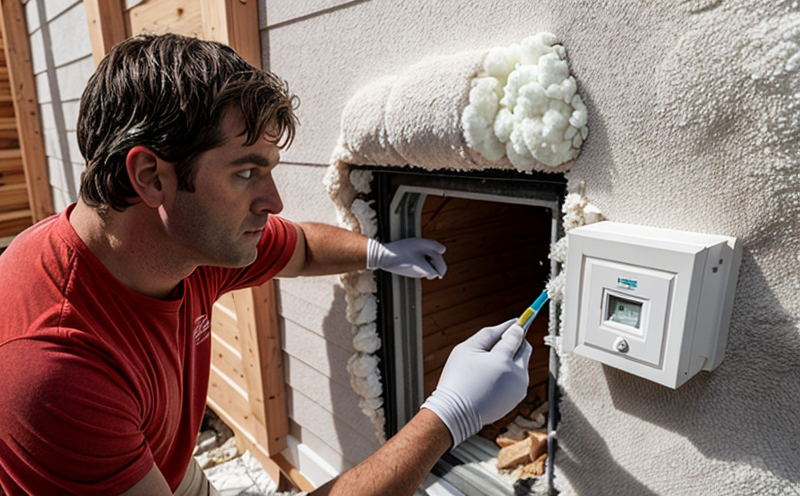ISO 8302 Thermal Performance Measurement of Panels
The ISO 8302 standard provides a method to measure the thermal resistance and associated parameters of panels used in building construction. This test is critical for ensuring that insulation materials meet the required performance standards, thereby enhancing energy efficiency and reducing heat loss or gain.
Thermal performance plays a vital role in the design and implementation of energy-efficient buildings. The accuracy and reliability of this measurement directly impact the overall building performance and compliance with local regulations. This service ensures that your panels adhere to international standards, providing you with confidence in their performance.
The test procedure involves placing the panel between two chambers at different temperatures. The heat flow through the panel is measured using calibrated thermocouples or other similar devices. The results are then used to calculate thermal resistance (R-value), which indicates how well the material resists the passage of heat.
For accurate testing, it’s essential to follow strict protocols for specimen preparation and test setup. The panels must be conditioned according to the standard's requirements before testing. This includes maintaining specific humidity levels and temperature gradients across the panel to ensure consistent results.
The instrumentation used in this process is highly sophisticated and precision-engineered to meet stringent accuracy and repeatability standards. The system must have a high degree of reproducibility, ensuring that measurements are consistent regardless of the operator or testing facility.
Once the test is complete, a detailed report is generated summarizing all relevant data points including R-values, temperature differences, and any other pertinent information. This comprehensive document serves as evidence of compliance with ISO 8302 standards and can be used for certification purposes.
The importance of this service cannot be overstated in today’s world where sustainability and energy efficiency are top priorities. By ensuring that your panels meet these stringent requirements, you contribute not only to better building performance but also to environmental conservation efforts.
Compliance with ISO 8302 is essential for businesses operating within the construction industry as it helps maintain quality standards across projects. It ensures that all stakeholders involved in a project have confidence that the materials being used will perform reliably under real-world conditions.
In conclusion, investing in this service offers numerous benefits including improved product quality, enhanced energy efficiency, and reduced carbon footprint. It also provides peace of mind knowing that your products meet international standards and are ready for market deployment.
Why Choose This Test
Selecting ISO 8302 thermal performance measurement as part of your testing strategy offers several key advantages:
1. Compliance with International Standards: Ensuring that your products meet global standards is crucial for maintaining consistent quality and reliability.
2. Enhanced Product Performance: Accurate measurements provide valuable insights into how your panels will perform in various environments, allowing for continuous improvement of product design.
3. Cost Savings: By identifying potential issues early on through thorough testing, you can minimize costly rework or recalls later down the line.
4. Competitive Edge: Demonstrating adherence to rigorous international standards can give your company a competitive advantage in both domestic and export markets.
5. Regulatory Compliance: Meeting regulatory requirements is essential for avoiding fines, penalties, or other sanctions that could harm business operations.
6. Customer Confidence: Providing clear evidence of compliance builds trust with clients and end-users who are increasingly focused on sustainability practices.
Environmental and Sustainability Contributions
The use of ISO 8302 thermal performance measurement contributes significantly to environmental protection by promoting energy efficiency and reducing greenhouse gas emissions. Here’s how:
1. Reduced Energy Consumption: By optimizing insulation materials based on precise measurements, buildings can achieve better heat retention during winter months and cooling in summer, leading to lower heating and cooling costs.
2. Lower Carbon Footprint: Less energy required for heating and cooling translates into fewer fossil fuel-based power plants being utilized, thus decreasing overall carbon emissions.
3. Resource Conservation: Efficient use of resources such as electricity and natural gas results in less strain on local infrastructure, contributing to long-term sustainability goals.
4. Green Building Certifications: Compliance with ISO 8302 standards can help earn green building certifications like LEED or BREEAM, which are highly valued by eco-conscious consumers and organizations alike.
5. Healthier Indoor Environment: Properly insulated buildings tend to have better air quality since they prevent drafts and reduce moisture buildup inside homes or offices.
6. Economic Benefits: Over time, the savings achieved from reduced energy consumption can offset the initial investment in more efficient materials, offering a positive return on investment (ROI).
Competitive Advantage and Market Impact
Implementing ISO 8302 thermal performance measurement into your quality assurance process can offer significant competitive advantages:
1. Enhanced Reputation: Companies known for their commitment to sustainability often attract more customers, investors, and partners interested in environmental responsibility.
2. Attractive to Eco-Friendly Consumers: In a market increasingly driven by consumer awareness about corporate social responsibility (CSR), having robust testing protocols demonstrates genuine care towards the environment.
3. Differentiation from Competitors: Offering products that have been independently verified as meeting high environmental standards can set your brand apart from competitors who may not adhere to similar practices.
4. Increased Market Reach: Meeting international standards opens up opportunities for selling goods in countries with stringent regulations, expanding your customer base beyond domestic markets.
5. Improved Supplier Relationships: Partnering with suppliers who also prioritize sustainability can strengthen relationships and lead to more mutually beneficial collaborations.
6. Future-Proofing Your Business: As environmental concerns continue to grow in importance globally, being ahead of the curve on such issues positions your company for future growth and resilience against potential changes in legislation or consumer preferences.





